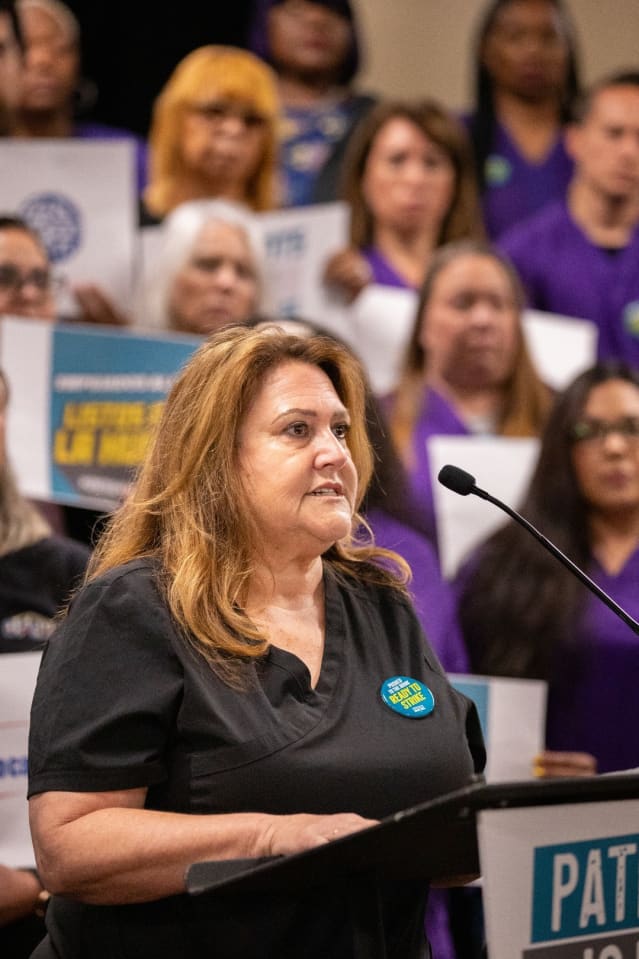Tens of thousands of Kaiser Permanente healthcare workers are poised to take a strike-authorization vote starting this weekend for what could be the largest healthcare-worker strike in U.S. history, union leaders announced Thursday.
The Coalition of Kaiser Permanente Unions has been in negotiations with Kaiser since April, pushing for higher wages and improved staffing levels, for the first time since the coronavirus pandemic. The last negotiations were in 2019, pre-pandemic.
Healthcare workers have since faced worsening staffing shortages due to burnout and other factors.

Catherine Engler, a nurse at Kaiser Permanente in Carlsbad, Calif., spoke Thursday at a news conference in which a union coalition representing the healthcare workers announced that strike-authorization votes for 85,000 workers are imminent.
Coalition of Kaiser Permanente Unions
“I lie awake at night wondering if I did everything I’m supposed to for… my patients,” said Catherine Engler, a licensed vocational nurse in Carlsbad, Calif., during a news conference Thursday, during which she said patients are waiting longer to be seen, or having to settle for phone appointments. “It scares me that we don’t have enough staff. Healthcare workers are leaving the industry because they can’t take it anymore.”
If the coalition does not reach an agreement with Kaiser by Saturday, the strike vote will begin Saturday in Denver. In California — which is home to the majority of the 85,000 healthcare workers represented by the coalition — the vote will begin Monday and run through Sept. 13, said Dave Regan, president of the SEIU-United Healthcare Workers West, during the news conference.
The national contract expires Sept. 30, and a strike could come as soon as Oct. 1, according to the coalition. Besides Colorado and California, other states affected would be Oregon, Hawaii, Maryland, Virginia and Washington, plus Washington D.C. A strike could affect up to 12 million Kaiser members, Regan said.
Union officials are accusing Kaiser of unfair labor practices, including refusing to bargain in good faith.
“Kaiser has lost its way,” said Regan, who leads the union that represents the majority of the Kaiser employees affected — 58,000 California healthcare workers out of the 85,000 total represented by the coalition.
The coalition has filed more than a dozen unfair-labor-practice charges against Kaiser with the National Labor Relations Board, mostly related to accusations by the unions that Kaiser has failed to provide information they deem necessary for bargaining.
On wages, Regan said that in addition to raises for employees over the next four years, the union has proposed a $25-an-hour minimum wage across all of Kaiser, compared with Kaiser’s proposal of $21 an hour in 2026.
The coalition said that despite its nonprofit status, Kaiser has reported more than $24 billion in profit over the last five years.
See: Striking workers need unemployment pay — and fast, this lawmaker says
When reached by MarketWatch on Thursday, a Kaiser spokesperson referred to a statement on the organization’s website, which includes Kaiser calling strike authorizations a common bargaining tactic by unions.
Regarding wages, Kaiser’s statement said it disagrees with the unions’ position that wage increases should not be market-based. “This prevents us from addressing wage disparities that exist in many of Kaiser Permanente’s markets,” the healthcare giant said.
Addressing concerns about staffing levels, Kaiser’s statement said that it and the coalition had set a goal to hire 10,000 new represented workers in 2023, and that it has filled more than 6,500 of those positions so far.
Also in the statement, Kaiser said it is committed to reaching an agreement and is “confident” it will happen by the contract’s expiration date. “Bargaining is dynamic and involves give-and-take,” the statement said. “Accusations from union leaders that Kaiser Permanente has not bargained in good faith are unfounded and counterproductive.”
The threat of a healthcare strike comes as U.S. auto workers are also preparing for a possible strike; as UPS workers just approved a new contract that averted a huge strike; as Hollywood writers and actors remain on strike; as hotel workers in Southern California continue their rolling strike; as public-sector workers have walked off the job; and as workers across industries and income levels are either taking labor action or are organizing.